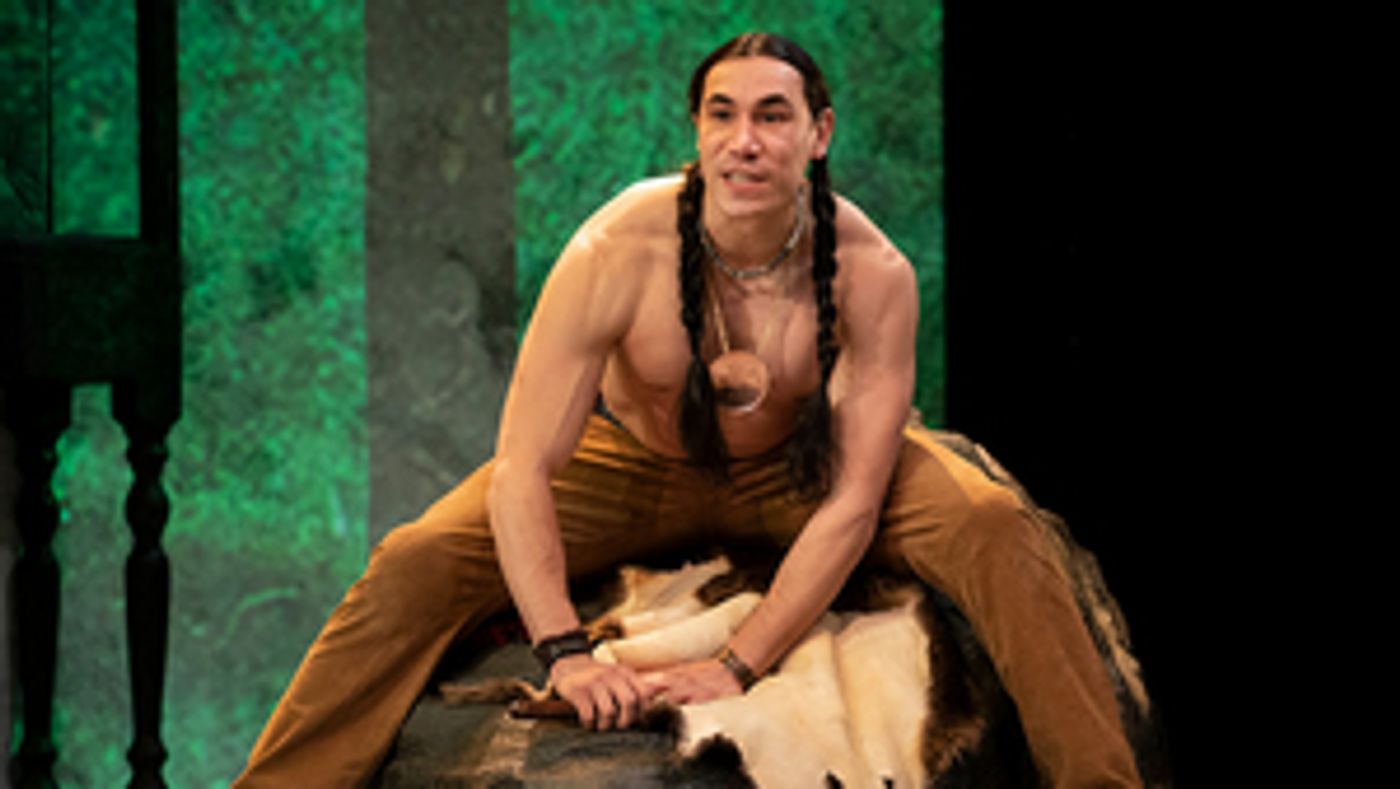Review: MANHATTA at Yale Rep

Manahatta," the impressive world premiere from Mary Kathryn Nagle at the Yale Repertory Theatre in New Haven, CT, history repeats itself with devastating consequences in lower Manhattan as the violent removal of the indigenous Delaware Lenape people in colonial times is echoed by the heartless destruction of the nation's economy by Wall Street four centuries later.
While Nagle, a member of the Cherokee nation, may be stretching the similarities-after all, the 2008 financial crisis impacted more than just Native Americans-she concentrates her focus on some contemporary members of the Lenape community, whose trail of forced relocations finds them finally settled in 2008 Oklahoma.
Through the fictional story of Jane Snake, a Lenape who became a Rhodes Scholar and has just found work on Wall Street in an unnamed company remarkably similar to Lehman Brothers, Nagle is able to put a family at the center of the Great Recession, while providing simultaneous flashbacks to a story about a Lenape family ultimately uprooted following Peter Minuit's "purchase" of their Manahatta island home for a host of trinkets and wampum.
Nagle and her director, Louise Woolery, manage to progress the plotlines of both families without too much confusion, although Jane's attempted wooing by Luke, an earnest albeit naive Native American boy raised by a white father back in her Oklahoma hometown, sometimes confusingly overlaps a growing relationship between Jane's historical counterpart, Le-le-wa'-you, and the doomed firebrand resister, Se-ket-tu-may-qua, back in the 17th century.
Jane and her colonial doppelganger, are both played Lily Gladstone, who hails from the Ampskapi Pikani, Kainaiwa and Nimii'puu nations. As Jane, Gladstone demonstrates an initial reticence as she finds herself among the bigger players on Wall Street but shows a clear growth in confidence and resolve as her expertise in mathematics and persuasion makes her a formidable player in the high stakes world of derivatives and other innovative but risky financial products. Her Manahatta-bred character, who has never encountered a white man before, exhibits a determined innocence until faced with the reality of betrayal by their usurpers.
Steven Flores, a descendant of the Numunuu (Comanche) and Mexican peoples, plays Luke as the family-pleasing young man destined to work in his white father's bank, and as the heroic but outmatched fighter for his people's legacy, inspired somewhat loosely by an actual 19th century Lenape leader who served as a guide for Union soldiers in the Civil War and later participated in the Medicine Lodge treaty negotiations of 1867. His stern grimace dominates a photograph on the back wall of Mariana Sanchez's accommodating set, which thanks to Mark Holthusen's projections, can become a hidden outpost in upper Manahatta or a family homestead in Anadarko, Oklahoma.
Other indigenous peoples in the cast include the formidable Carla-Rae as the mother in both time frames. Of Seneca/Mohawk/French Canadian descent, she is especially effective as the stubbornly proud Bobbie, Jane's mother, whose commitment to her home and her tribe following the death of her husband, leads her into the vortex of overloaded debt that impacted so many families during the late aughts. Shyla Lefner effectively plays Gladstone's sister in each sequence, as the irresponsibly curious Toosh-ki-pa-kwis-I in the Manahatta sequences and as the hard-working Debra in the Oklahoma-set scenes as she reconnects with her heritage by trying to save the Lenape language.
Back on Wall Street, Danforth Comins is fine as Jane's initially aloof mentor who shepherds her rise to the CFO position at her firm with a hint of masculine privilege and grudging admiration for her abilities, while Jeffrey King plays a hard-driving Dick Fuld whose only concern is results-oriented and misses the damage that his new products are doing not only to real actual people but to his firm and its employees as well. Both King and Comins, along with T. Rider Smith, play various characters back in the colonial times with Comins as a particularly conflicted officer charged with removing the Lenape with any means possible, King as an over-confident Peter Minuit, who regards the natives with nothing more than disdain, and Smith as a particularly unctuous minister without any conception that the Lenape may have their own worthy set of beliefs.
Nagle succeeds in maintaining an audience's interest in both stories, with each building to their own tragic or at least rueful conclusions. Stephanie Bahniuk's costumes are effective at conveying the sudden plot jumps in time and locations, ranging from the distinctive flavorings of Dutch New Amsterdam to the contemporary apparel of both Wall Street and reservation area Oklahoma. Joe Baker, the Executive Director of Connecticut's Mashantucket Pequot Museum and Research Center and founder of the Lenape Center in New York City, has assured in his role as Lenape Cultural Consultant, that the costumes, props and cultural artifacts seen in the show have been carefully recreated for this production for accuracy and using contemporary fabrication techniques.
Lighting designer Emma Dean, an enrolled member of the Mandan, Hidatsa and Arikara nation as well as a third year MFA candidate at the Yale School of Drama, has provide subtle shadings of lighting to reflect both indoor and outdoor settings, while Ty Defoe, a member of the Oneida and Ojibwe nations, served as Movement Coordinator. Paul James Prendergast has provided an impressive sound and music score that enhances the atmosphere especially in the Manahatta and Oklahoma settings and through various scene changes.
Nagle, who is also a lawyer and Native American activist recently served as the Executive Director of the Yale Indigenous Performing Arts Program, describes her play as "the blueprint for the entire nation, a Tribal Nation who story has been erased but whose language gives rise to the name Americans use today for that land, the simultaneous existence of erasure and perseverance." Her play should effectively assure that for future generations of her tribe and others.
"Manhatta" plays at Yale Rep through February 15. For information and tickets, contact (860) 432-1234 or visit www.yalerep.org.
Reader Reviews
Videos

